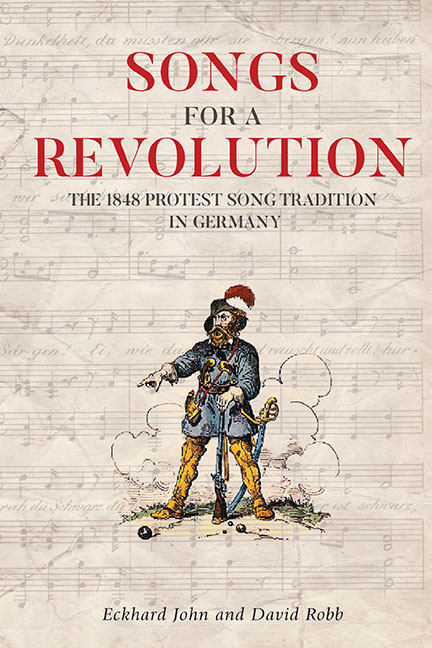Book contents
- Frontmatter
- Contents
- Preface
- Introduction: The Emergence of Political Song 1830–48
- Part I Before 1848: The Vormärz
- Part II 1848–49
- Part III 1848 in Memory
- Conclusion: The Making of Tradition; The Protest Songs of 1848 in the German Folk Revival 303
- Bibliography
- Discography
- Index of Names and Terms
- Index of Song Titles
18 - “So hab’ ich es nach langen Jahren” (“Wohlgeboren”)
Published online by Cambridge University Press: 23 October 2020
- Frontmatter
- Contents
- Preface
- Introduction: The Emergence of Political Song 1830–48
- Part I Before 1848: The Vormärz
- Part II 1848–49
- Part III 1848 in Memory
- Conclusion: The Making of Tradition; The Protest Songs of 1848 in the German Folk Revival 303
- Bibliography
- Discography
- Index of Names and Terms
- Index of Song Titles
Summary
GEORG HERWEGH WROTE the poem “Wohlgeboren” (Well-Born) in late 1841 in Paris. It is a satirical “Rollengedicht” (dramatic monologue) in which the narrator figure reveals himself to be a social conformer through the irony of his own words. It first became a song in the 1960s and 1970s, when it was revived by Peter Rohland and other singers in the German folk movement.
Herwegh first published “Wohlgeboren” in February 1842 in the magazine Telegraph für Deutschland and subsequently in the second volume of his Gedichte eines Lebendigen (Poems of a Living Man) in 1843. It appeared there alongside the poem “Hochwohlgeboren” (High-Born) by Franz Dingelstedt (1814–81) under the caption “von zwei deutschen Dichtern in Paris” (by two German poets in Paris). Herwegh had struck up a close friendship with Dingelstedt through the winter of 1841–42 in Paris.
In “Wohlgeboren” the narrator assumes the role of a conformist bourgeois citizen. With playful irony, he relates how in his youth he “tobte sich aus” (let off steam), experimenting with politically inappropriate ideals and wearing the black, red, and gold ribbon (a reference to the patriotism of the student fraternities). Now having achieved a social standing, however, he is no longer interested in politics. He would rather be “ein guter Bürger” (a good citizen), enjoy a comfortable life, and settle down with a medal for his services.
The inspiration for this satire of bourgeois conformity and moral cowardliness was derived from “Le poète de cour” (Poet of the Court, 1824), a chanson by the French lyricist Pierre Jean de Béranger. As well as the ironical form, both poems share the theme of the betrayal of enlightened ideals. While Béranger vents his sarcasm on the fawning behavior of a wannabe court poet—one who is willing to sell himself to politicians, write odes to egoism, and heap praise on high ranking officials— Herwegh portrays a caricature of the German “Bürger” who rejects democratic tendencies. He wants to be left in peace; to be spared the cries for “verdammte Freiheit” (damned freedom) that endanger his strident endeavors for respectability.
In the nineteenth century, Herwegh's poem was disseminated chiefly through the various editions of his volume Gedichte eines Lebendigen. However, there is no evidence that the text was ever set to music or performed as a song.
- Type
- Chapter
- Information
- Songs for a RevolutionThe 1848 Protest Song Tradition in Germany, pp. 247 - 253Publisher: Boydell & BrewerPrint publication year: 2020

